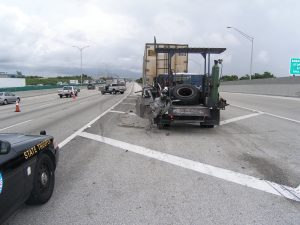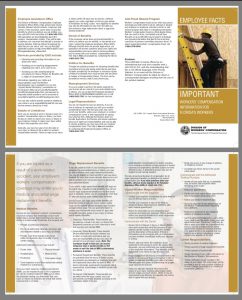 Our firm represented a gentleman who sustained life-threatening injuries after being struck by an SUV while standing next to his incapacitated truck on the side of Interstate 95 in Broward County, Florida. (See blog photo.) The accident happened in broad daylight during rush hour traffic.
Our firm represented a gentleman who sustained life-threatening injuries after being struck by an SUV while standing next to his incapacitated truck on the side of Interstate 95 in Broward County, Florida. (See blog photo.) The accident happened in broad daylight during rush hour traffic.
Following a tire blowout, our client had pulled his semi-tractor trailer rig into the highway gore, a paved section of roadway which separated northbound I-95 thru-lanes from two exit lanes, to await the arrival of roadside assistance summoned by his employer to replace the tire. The roadside assistance vehicle that arrived on the scene was owned and operated by an independent contractor. Essentially, it was a beat up old jalopy — see photo — that was not equipped with any warning lights of the type highway drivers have come to expect, and its small factory hazard lights were partly obscured by a rear metal door lowered to access the truck bed. It pulled up directly behind the trailer, blocking the trailer’s warning lights and hazard strips.
As our client was standing next to the service technician, who was in the process of changing the tire on the left side of the trailer, both he and the technician were struck by a northbound vehicle whose driver had failed to timely recognize that the vehicles were stopped rather than moving with the regular flow of traffic. At the last split second this driver recognized the situation and swerved sharply to avoid striking the service vehicle. His vehicle clipped the left rear of the vehicle before striking the two gentlemen. His vehicle was totaled and each of the three individuals were transported to the hospital with severe injuries.
We sued the driver and the roadside assistance company. Our allegations against the company included the failure to employ adequate safety warning devices on its vehicle. Through research in this and other cases, we knew that daylight crashes involving disabled vehicles are commonplace. Among the explanations for the phenomenon are the theories known as “follow-the-leader” and “looming distance.” They rely on human perception and reaction to various roadway situations. (In 2013, we were involved in obtaining a $2.7 million jury verdict, in Orlando, Florida, in reliance on the “looming distance” theory. In broad daylight under clear weather conditions, our client drove a Disney bus into the back of a large motor coach stopped on the highway for mechanical reasons. The motor coach’s hazard lights were on and it had been stopped long enough for the operator to exit and inspect the vehicle, then walk to the side of the road to make a phone call. Our client, who was not distracted and did not have any visual impairments, had a 1/4 mile unobstructed view as he approached on a straightaway. Because of “looming distance” factors, he was not able to realize until the accident was unavoidable that the motor coach was stopped rather than moving.)
Continue reading
 Even when an insurance company is willing to pay fair market value on a wrecked or damaged vehicle, it sometimes makes more sense to repair rather than have it declared a total loss. This can be the case when it is not practical to purchase another vehicle with the amount of money payable under the total loss calculation.
Even when an insurance company is willing to pay fair market value on a wrecked or damaged vehicle, it sometimes makes more sense to repair rather than have it declared a total loss. This can be the case when it is not practical to purchase another vehicle with the amount of money payable under the total loss calculation. Florida Injury Attorney Blawg
Florida Injury Attorney Blawg









